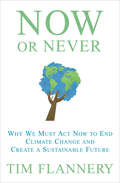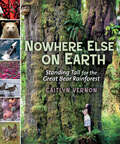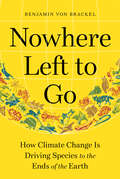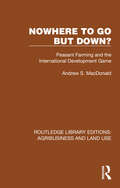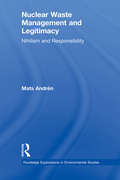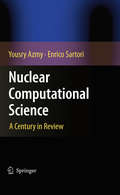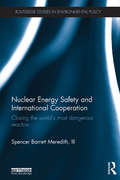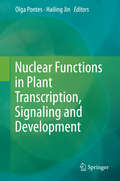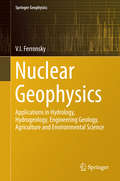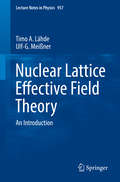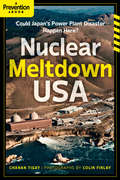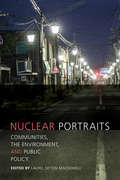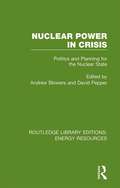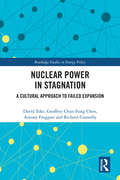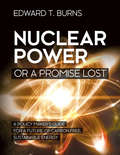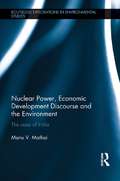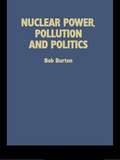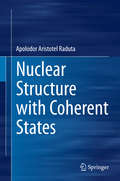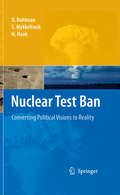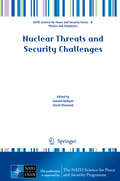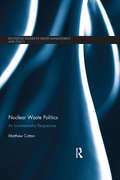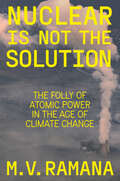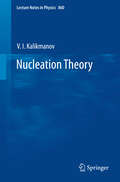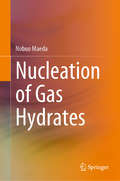- Table View
- List View
Now or Never: Why We Must Act Now to End Climate Change and Create a Sustainable Future (Quarterly Essay Ser. #No. 31)
by Tim FlanneryIn Now or Never, the internationally acclaimed author of The Weather Makers returns to the subject of climate change with a book that is at once a forceful call to action and a deeply (and often surprisingly) pragmatic roadmap toward sustainability. Utilizing the most up-to-the-minute data available, Tim Flannery offers a guided tour of the environmental challenges we face and their potential solutions in both the big picture and in specific detail. He explores everything from techniques for storing the carbon that dead plants release into the earth to the fragile balancing act between energy demands and food supply in India and China, from carbon-trading schemes in South America to a recent collaboration between a Danish wind-energy company and an automobile manufacturer that may produce a viable electric car and end the reign of big oil. Now or Never is a powerful, thought-provoking, and essential book about the most urgent issue of our time. It burns with Flannery’s characteristic mix of passion, scientific precision, and "offhand interdisciplinary brilliance” (Entertainment Weekly).
Nowhere Else on Earth: Standing Tall for the Great Bear Rainforest
by Caitlyn VernonYou don't have to live in the Great Bear Rainforest to benefit from its existence, but after you read Nowhere Else on Earth you might want to visit this magnificent part of the planet. Environmental activist Caitlyn Vernon guides young readers through a forest of information, sharing her personal stories, her knowledge and her concern for this beautiful place. Full of breathtaking photographs and suggestions for ways to preserve this unique ecosystem, Nowhere Else on Earth is a timely and inspiring reminder that we need to stand up for our wild places before they are gone. Visit http://www.greatbearrainforest.ca to find teacher and student resources, view the online photo gallery, or read a sample chapter from the book. To access the free teacher's guide for Nowhere Else on Earth, click here:http://orcabook.com/nowhereelseonearth/guides/teachersguide.pdf.
Nowhere Left to Go: How Climate Change Is Driving Species To The Ends Of The Earth
by Benjamin von BrackelHarrowing journeys of animals and plants—fleeing skyrocketing temperatures and mega-droughts—reported from the frontlines of the greatest migration of species since the Ice Age As humans accelerate global warming while laying waste to the environment, animals and plants must flee to the margins: on scattered nature reserves, between major highways, or among urban sprawl. And when even these places become too hot and inhospitable, wildlife is left with only one path to survival: an often-formidable journey toward the poles as they race to find a new home in a warming world. Tropical zones lose their inhabitants, beavers settle in Alaska, and gigantic shoals of fish disappear—just to reappear along foreign coastlines. Award-winning environmental journalist Benjamin von Brackel traces these awe-inspiring journeys and celebrates the remarkable resilience of species around the world. But the lengths these plants and animals must go to avoid extinction are as alarming as they are inspirational: Sea animals—like fish—move on average 45 miles a decade to cooler regions, while land animals—like beavers and butterflies—move 11 miles. As even the poles of the Earth heat up, we’re left with a stark and irreversible choice: Halt the climate emergency now, or face a massive die-off of species, who are increasingly left with nowhere else to go.
Nowhere To Go But Down?: Peasant Farming and the International Development Game (Routledge Library Editions: Agribusiness and Land Use #17)
by Andrew S. MacDonaldOriginally published in 1989, this book is a unique examination of subsistence farming in the developing world, and its potential for development. The author writes from the conviction that the farming system is limited in its potential for development by the energy value of manpower and that unless the plight of developing world communities is understood and the importance of manpower constraint recognized, inputs of development funds will be wasted. Clarifying the strengths and limitations of the subsistence farming system, the book makes clear the complexities and difficulties encountered in achieving agricultural development in the poorest countries – providing an informed insight into the inevitability of future famine.
Nuclear Waste Management and Legitimacy: Nihilism and Responsibility (Routledge Explorations in Environmental Studies)
by Mats AndrénNuclear technology places special demands on society and both nuclear weapons and nuclear energy for peaceful purposes require a large measure of security and monitoring at the international level. This book focuses on nuclear waste management, which can work in democratic countries only if viewed as legitimate by the population. This book posits the inability of democracies to establish such legitimacy as an explanation for the current absence of public policy decisions that can identify a solution. The problems are such that they can be resolved only if fundamental aspects of the modern notion of legitimacy are set aside.
Nuclear Computational Science
by Yousry Azmy Enrico SartoriNuclear engineering has undergone extensive progress over the years. In the past century, colossal developments have been made and with specific reference to the mathematical theory and computational science underlying this discipline, advances in areas such as high-order discretization methods, Krylov Methods and Iteration Acceleration have steadily grown. Nuclear Computational Science: A Century in Review addresses these topics and many more; topics which hold special ties to the first half of the century, and topics focused around the unique combination of nuclear engineering, computational science and mathematical theory. Comprising eight chapters, Nuclear Computational Science: A Century in Review incorporates a number of carefully selected issues representing a variety of problems, providing the reader with a wealth of information in both a clear and concise manner. The comprehensive nature of the coverage and the stature of the contributing authors combine to make this a unique landmark publication. Targeting the medium to advanced level academic, this book will appeal to researchers and students with an interest in the progression of mathematical theory and its application to nuclear computational science.
Nuclear Energy Safety and International Cooperation: Closing the World's Most Dangerous Reactors (Routledge Studies in Environmental Policy)
by Spencer Barrett Meredith, IIITwenty-five years after the Chernobyl explosion, disaster struck once again after a tsunami overwhelmed the considerable safety measures at the Fukushima nuclear power plant in Japan. However, Fukushima had in place a solid containment structure to reduce the spread of radiation in the event of a worst-case scenario; Chernobyl did not. These two incidents highlight the importance of such safety measures, which were critically lacking in an entire class of Soviet-designed reactors. This book examines why five countries operating these dangerous reactors first signed international agreements to close them within a few years, then instead delayed for almost two decades. It looks at how political decision makers weighed the enormous short-term costs of closing those reactors against the long-term benefits of compliance, and how the political instability that dominated post-Communist transitions impacted their choices. The book questions the efficacy of Western governments’ efforts to convince their Eastern counterparts of the dangers they faced, and establishes a causal relationship between political stability and compliance behavior. This model will also enable more effective assistance policies in similar situations of political change where decision makers face considerable short-term costs to gain greater future rewards. This book provides a valuable resource for postgraduate students, academics and policy makers in the fields of nuclear safety, international agreements, and democratization.
Nuclear Functions in Plant Transcription, Signaling and Development
by Hailing Jin Olga PontesThe genome is more than a linear code as depicted by its DNA sequences as several interacting factors play a crucial role in shaping its organization and function. The complete sequences of a number of plant genomes and the recent advances of high-throughput technologies has fueled research efforts in the field of Plant Nuclear Biology unveiling numerous insights about the mechanisms underlying genome regulation. Genomic information is being integrated into molecular- and cellular-level mechanisms of the plant processes. A host of nuclear processes underlie key developmental processes as well as biotic and abiotic interactions. Non-coding RNAs have been increasingly recognized as players in gene expression and genome defense and integrity. However, in vivo, genomes exist as elaborate physical structures, and their functional properties are strongly determined by their cellular organization. Various types of subcellular structure have been identified in the nucleus, which are associated with transcription factors, RNA processing proteins and epigenetic regulators. Interestingly, these nuclear bodies display different behaviors in response to the environment. This book compiles a series of landmark discussions of the recent advances in plant nuclear biology research focusing in the functional relevance of the arrangement of genomes and nuclear processes that impact plant physiology and development.
Nuclear Geophysics
by V. I. FerronskyThe fundamentals of methods in nuclear geophysics and their practical applications in engineering geology, hydrology, hydrogeology, agriculture and environmental science are discussed in this book. The methods and apparatus based on absorption and scattering of gamma and neutron radiation for determination of density and soil moisture in natural conditions are presented in Chapters 2, 3, and 4. The theoretical fundamentals and installations of the penetration logging techniques where gamma, gamma-gamma and neutron logging in combination with static penetration form common complexes for engineering geology and hydrogeology exploration without boring holes are described. The developed constructions and practical use penetration logging installations for applications on land and marine shelves are described in Chapters 5, 6, 7, and 8. The physical fundamentals for the use of the natural stable and radioactive isotopes for study of the global hydrological cycle are provided. The experimental data, origin and distribution of cosmogenic and radiogenic isotopes in the oceans, atmospheric moisture, surface and underground waters are presented in Chapters 9, 10, and 11. The sources and conditions of the radioactive contamination of the natural waters are discussed in Chapters 12 and 13. This book will be of interest to scientists and researchers who use nuclear geophysics methods in engineering geology, hydrology, hydrogeology and hydrogeoecology. Lecturers, students, and postgraduates in these subjects will also find it useful.
Nuclear Lattice Effective Field Theory: An Introduction (Lecture Notes in Physics #957)
by Timo A. Lähde Ulf-G. MeißnerThis primer begins with a brief introduction to the main ideas underlying Effective Field Theory (EFT) and describes how nuclear forces are obtained from first principles by introducing a Euclidean space-time lattice for chiral EFT. It subsequently develops the related technical aspects by addressing the two-nucleon problem on the lattice and clarifying how it fixes the numerical values of the low-energy constants of chiral EFT. In turn, the spherical wall method is introduced and used to show how improved lattice actions render higher-order corrections perturbative. The book also presents Monte Carlo algorithms used in actual calculations. In the last part of the book, the Euclidean time projection method is introduced and used to compute the ground-state properties of nuclei up to the mid-mass region. In this context, the construction of appropriate trial wave functions for the Euclidean time projection is discussed, as well as methods for determining the energies of the low-lying excitations and their spatial structure. In addition, the so-called adiabatic Hamiltonian, which allows nuclear reactions to be precisely calculated, is introduced using the example of alpha-alpha scattering. In closing, the book demonstrates how Nuclear Lattice EFT can be extended to studies of unphysical values of the fundamental parameters, using the triple-alpha process as a concrete example with implications for the anthropic view of the Universe. Nuclear Lattice Effective Field Theory offers a concise, self-contained, and introductory text suitable for self-study use by graduate students and newcomers to the field of modern computational techniques for atomic nuclei and nuclear reactions.
Nuclear Magnetic Resonance Study on Multiple Superconducting Phases in UTe2 (Springer Theses)
by Katsuki KinjoThis book provides an insight into spin-triplet superconductivity, which rapidly becomes better understood in recent years, from the perspective of a microscopic measurement technique called nuclear magnetic resonance (NMR). The compound UTe2, the target material of this book, was confirmed to show superconductivity in 2018, and its peculiarity is very similar to that of other uranium-based ferromagnetic superconductors, ensuring spin triplet superconductivity. This book begins with the fundamentals of superconductivity and subsequently overviews research in spin-triplet superconductivity. The similarity between the high-field superconducting phase in UTe2 and the superconducting phase under pressure is particularly interesting among the various superconducting phenomena observed so far. This book provides a concise introduction to superconductivity, so that the book is also intended for wide readership including the beginners interested in the phenomenon of superconductivity and undergraduate and graduate students. It also cover the NMR measurement from the basic derivation, which is accessible for beginners. The target material UTe2 is skillfully described, including a selection of related works to this book.
Nuclear Meltdown, USA: Could Japan's Power Plant Disaster Happen Here?
by Chanan TigaySitting near four significant fault lines on the coastline of California, Diablo Canyon is just one of 65 nuclear power plants in the United States. After the nuclear meltdown in Fukushima, Japan, Americans are now asking, "Could it happen here?" This e-book original, based on an in-depth investigation commissioned exclusively for Prevention magazine by the award-winning photojournalist team of Chanan Tigay and Colin Finlay, explores the risks--to our planet and ourselves--of the plant and its impact on the people who live and work in the "happiest place in America."
Nuclear Portraits: Communities, the Environment, and Public Policy
by Laurel Sefton MacdowellIn the twenty-first century, nuclear energy has become a hotly contested issue. In the face of climate change, and the search for alternative forms of energy, nuclear power continues to affect the lives of communities around the world. In Nuclear Portraits, scholars from Europe, North America, and Asia demonstrate the complexity, controversy, contradictions, and dangers that surround many aspects of the nuclear industry. The resulting local, regional, national, and international concerns that arise, such as the disasters at Chernobyl and Fukushima, call into question the optimism espoused by the nuclear industry. We live in a world with more nuclear nations than ever before and energy policy is central to the mounting global concern about climate change. The innovative essays found in Nuclear Portraits will open your eyes to the realities of nuclear energy, thereby allowing you to decide for yourself whose side you are on.
Nuclear Power in Crisis: Politics and Planning for the Nuclear State (Routledge Library Editions: Energy Resources)
by David Pepper Andrew BlowersOriginally published in 1987. The Chernobyl disaster intensified the whole debate on the nuclear power industry. There was great public concern about the industry regulation, about the siting of nuclear facilities, including the dumping of nuclear waste, and about the alleged secretiveness of the industry. This book examines these and many other important aspects of the industry worldwide and provides much important original research. It focuses in particular on the political processes which control the industry, on waste disposal and on the social impact.
Nuclear Power in Stagnation: A Cultural Approach to Failed Expansion (Routledge Studies in Energy Policy)
by David Toke Richard Connolly Geoffrey Chun-Fung Chen Antony FroggattThis book studies the extent to which nuclear safety issues have contributed towards the stagnation of nuclear power development around the world, and accounts for differences in safety regulations in different countries. In order to understand why nuclear development has not met widespread expectations, this book focusses on six key countries with active nuclear power programmes: the USA, China, France, South Korea, the UK, and Russia. The authors integrate cultural theory and theory of regulation, and examine the links between pressures of cultural bias on regulatory outcomes and political pressures which have led to increased safety requirements and subsequent economic costs. They discover that although nuclear safety is an important upward driver of costs in the nuclear power industry, this is influenced by the inherent need to control potentially dangerous reactions rather than stricter nuclear safety standards. The findings reveal that differences in the strictness of nuclear safety regulations between different countries can be understood by understanding differences in cultural contexts and the changes in this over time. This book will be of great interest to students, scholars, and policymakers working on energy policy and regulation, environmental politics and policy, and environment and sustainability more generally.
Nuclear Power or a Promise Lost: A Policy Maker's Guide for a Future of Carbon Free, Sustainable Energy
by Edward T. BurnsThis book captures the status of current electrical energy markets including the principal forces affecting decisions on selecting an energy source. It represents a seminal work that lays out the electrical energy decision tree for selecting an energy sou
Nuclear Power, Economic Development Discourse and the Environment: The Case of India (Routledge Explorations in Environmental Studies)
by Manu V. MathaiNuclear power is often characterized as a "green technology." Technologies are rarely, if ever, socially isolated artefacts. Instead, they materially represent an embodiment of values and priorities. Nuclear power is no different. It is a product of a particular political economy and the question is whether that political economy can helpfully engage with the challenge of addressing the environmental crisis on a finite, inequitable and shared planet. For developing countries like India, who are presently making infrastructure investments which will have long legacies, it is imperative that these investments wrestle with such questions and prove themselves capable of sufficiency, greater equality and inclusiveness. This book offers a critique of civilian nuclear power as a green energy strategy for India and develops and proposes an alternative "synergy for sustainability." It situates nuclear power as a socio-technical infrastructure embodying a particular development discourse and practice of energy and economic development. The book reveals the political economy of this arrangement and examines the latter’s ability to respond to the environmental crisis. Manu V. Mathai argues that the existing overwhelmingly growth-focused, highly technology-centric approach for organizing economic activity is unsustainable and needs to be reformed. Within this imperative for change, nuclear power in India is found to be and is characterized as an "authoritarian technology." Based on this political economy critique the book proposes an alternative, a synergy of ideas from the fields of development economics, energy planning and science, technology and society studies.
Nuclear Power, Pollution and Politics
by Bob BurtonPlaces the environmental issues related to the production of nuclear power in their political context. It evaluates the extent of nuclear pollution, in comparison with other forms of power, and looks at the future of energy.
Nuclear Structure with Coherent States
by Apolodor Aristotel RadutaThis book covers the essential features of a large variety of nuclear structure properties, both collective and microscopic in nature. Most of results are given in an analytical form thus giving deep insight into the relevant phenomena. Using coherent states as variational states, which allows a description in the classical phase space, or provides the generating function for a boson basis, is an efficient tool to account, in a realistic fashion, for many complex properties. A detailed comparison with all existing nuclear structure models provides readers with a proper framework and, at the same time, demonstrates the prospects for new developments. The topics addressed are very much of current concern in the field. The book will appeal to practicing researchers and, due to its self-contained account, can also be successfully read and used by new graduate students.
Nuclear Test Ban
by S. Mykkeltveit Hein HaakThe book gives a broad presentation in laymen's language of the creation and the implementation of the treaty prohibiting nuclear test explosions (Comprehensive Nuclear-Test-Ban Treaty: CTBT), one of the key guarantors of nuclear non-proliferation. The writers, who personally guided this work for more than 25 years, give a unique insight into the challenging international work to establish a complex technological system with global coverage in a political environment. Extensive nuclear testing has occurred and this is comprehensively reviewed, as are the arguments in favour of a test ban and efforts to implement one. The Conference on Disarmament in Geneva witnessed unprecedented efforts by scientists from around the world to form a common understanding of how to verify a test ban treaty and develop a prototype global verification system; work that was significant in building confidence at the height of the Cold War. The political negotiations and the Treaty itself are briefly analysed, but the main part of the book is devoted to more than a decade of effort by the Preparatory Commission for the CTBT Organization to implement the Treaty and its verification system: the most comprehensive verification system ever created, with a global coverage connecting more than 300 monitoring stations and including an intrusive on-site inspection regime. The first, most promising test results are also presented. An essential element of the book is its assessment of the experience gained through many years of political, managerial and technical activity. Such lessons, if well learned, can benefit the negotiations of future international treaties where verification is crucial, such as in arms control, disarmament or the environment.
Nuclear Threats and Security Challenges
by David Diamond Samuel ApikyanWith the dissolution of the Soviet Union the nuclear threats facing the world are constantly evolving and have grown more complex since the end of the Cold War. The diversion of complete weapon systems or nuclear material to rogue nations and terrorist organizations has increased. The events of the past years have proved the necessity to reevaluate these threats on a level never before considered. In recognition that no single country possesses all of the answers to the critical scientific, institutional and legal questions associated with combating nuclear and radiological terrorism, the NATO Advanced Research Workshop on "Preparedness for Nuclear and Radiological Threats" and this proceeding was structured to promote wide-ranging, multi-national exploration of critical technology needs and underlying scientific challenges to reducing the threat of nuclear/radiological terrorism; to illustrate through country-specific presentations how resulting technologies were used in national programs; and to outline the role of legal, policy and institutional frameworks in countering nuclear/ radiological terrorism. One key outcome of this book is better understanding of the interdependent contributions from across the international community of the scientific and technological components and the legal, policy and institutional components to combating nuclear and radiological threats.
Nuclear Waste Politics: An Incrementalist Perspective (Routledge Studies in Waste Management and Policy)
by Matthew CottonThe question of what to do with radioactive waste has dogged political administrations of nuclear-powered electricity-producing nations since the inception of the technology in the 1950s. As the issue rises to the forefront of current energy and environmental policy debates, a critical policy analysis of radioactive waste management in the UK provides important insights for the future. Nuclear Waste Politics sets out a detailed historical and social scientific analysis of radioactive waste management and disposal in the UK from the 1950s up to the present day; drawing international comparisons with Sweden, Finland, Canada and the US. A theoretical framework is presented for analysing nuclear politics: blending literatures on technology policy, environmental ethics and the geography and politics of scale. The book proffers a new theory of "ethical incrementalism" and practical policy suggestions to facilitate a fair and efficient siting process for radioactive waste management facilities. The book argues that a move away from centralised, high capital investment national siting towards a regional approach using deep borehole disposal, could resolve many of the problems that the high stakes, inflexible "megaproject" approach has caused across the world. This book is an important resource for academics and researchers in the areas of environmental management, energy policy, and science and technology studies.
Nuclear is Not the Solution: The Folly of Atomic Power in the Age of Climate Change
by M.V. RamanaNUCLEAR POWER WILL SLOW OUR RESPONSE TO CLIMATE CHANGE AND INCREASE THE RISK OF WEAPONS PROLIFERATION AND CATASTROPHETHE CLIMATE CRISIS has propelled nuclear energy back into fashion. Its proponents argue we already have the technology of the future and that it only needs perfection and deployment. Nuclear Is Not the Solution demonstrates why this sort of thinking is not only naïve but dangerous.Even beyond the horrific implications of meltdown and the intractable problem of waste disposal, nuclear is not practicable on such a large scale. Any appraisal of future energy technology depends on two important parameters: cost and time. Nuclear fails on both counts. It is more costly than its renewable competitors wind and solar. And, importantly given the need for rapid transformation, it is slow. A plant takes a decade to come online. If you include permits and fundraising, this adds another decade. And we should not forget the deep roots it has in the defense industry.M. V. Ramana&’s powerful book destroys any illusion that nuclear is our answer to climage change, untangling technical arguments into simple and sensible language. Importantly, Nuclear Is Not the Solution also unmasks the powerful groups with vested interests in the maintenance of the status quo, currently working hard to greenwash a spectacularly dirty industry.
Nucleation Theory
by V. I. KalikmanovOne of the most striking phenomena in condensed matter physics is the occurrence of abrupt transitions in the structure of a substance at certain temperatures or pressures. These are first order phase transitions, and examples such as the freezing of water are familiar in everyday life. The conditions at which the transformation takes place can sometimes vary. For example, the freezing point of water is not always 0°C, but the liquid can be supercooled considerably if it is pure enough and treated carefully. The reason for this phenomenon is nucleation. This monograph covers all major available routes of theoretical research of nucleation phenomena (phenomenological models, semi-phenomenological theories, density functional theories, microscopic and semi-microscopic approaches), with emphasis on the formation of liquid droplets from a metastable vapor. Also, it illustrates the application of these various approaches to experimentally relevant problems. In spite of the familiarity of the involved phenomena, it is still impossible to calculate nucleation accurately, as the properties and the kinetics of the daughter phase are insufficiently well known. Existing theories based upon classical nucleation theory have on the whole explained the trends in behavior correctly. However they often fail spectacularly to account for new data, in particular in the case of binary or, more generally, multi-component nucleation. The current challenge of this book is to go beyond such classical models and provide a more satisfactory theory by using density functional theory and microscopic computer simulations in order to describe the properties of small clusters. Also, semi-phenomenological models are proposed, which attempt to relate the properties of small clusters to known properties of the bulk phases. This monograph is an introduction as well as a compendium to researchers in soft condensed matter physics and chemical physics, graduate and post-graduate students in physics and chemistry starting on research in the area of nucleation, and to experimentalists wishing to gain a better understanding of the efforts being made to account for their data.
Nucleation of Gas Hydrates
by Nobuo MaedaThis book introduces readers to experimental techniques of general utility that can be used to practically and reliably determine nucleation rates. It also covers the basics of gas hydrates, phase equilibria, nucleation theory, crystal growth, and interfacial gaseous states. Given its scope, the book will be of interest to graduate students and researchers in the field of hydrate nucleation.The formation of gas hydrates is a first-order phase transition that begins with nucleation. Understanding nucleation is of interest to many working in the chemical and petroleum industry, since nucleation, while beneficial in many chemical processes, is also a concern in terms of flow assurance for oil and natural gas pipelines. A primary difficulty in the investigation of gas hydrate nucleation has been researchers’ inability to determine and compare the nucleation rates of gas hydrates across systems with different scales and levels of complexity, which in turn has limited their ability to study the nucleation process itself.This book introduces readers to experimental techniques that can be used to practically and reliably determine the nucleation rates of gas hydrate systems. It also covers the basics of gas hydrates, phase equilibria, nucleation theory, crystal growth, and interfacial gaseous states. Given its scope, the book will be of interest to graduate students and researchers in the field of hydrate nucleation.
